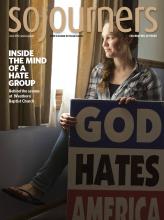WITHOUT SOME advance warning, you might not know that Jeff Sharlet is a man of God. That’s not an insult or backward compliment so much as it is fact. Though perhaps best known for his acclaimed nonfiction expose The Family: The Secret Fundamentalism at the Heart of American Power, Sharlet doesn’t beat readers over the head with the proverbial Bible he carries in his knapsack. If you don’t know what clues to look for—tales of Germans born again in Oklahoma, descriptions of hipster trucker caps emblazoned with flashy youth crusade logos—you might miss some of his most powerful nods to spiritual and religious influence in his travels. You might mistake the nondenominational journalist for just another fantastically gifted storyteller, a shrewd correspondent reporting back from remote spiritual enclaves, rather than a disciple of God seeking to understand those with whom he shares some belief.
Sweet Heaven When I Die begins by tracing Sharlet’s youthful days visiting a girlfriend’s Colorado ranch and his grandmother’s Knoxville home. His keen sense of personal history first grounds his essays in what is clearly important in his own life: the closeness of loved ones, the nearness of God. But he quickly moves beyond situating himself in his writing and instead steps back to peer like a prophet into the lives of others—philosopher and educator Cornel West or Yiddish novelist Chava Rosenfarb.
Sharlet also nimbly passes through the outer realms of faith and lack thereof. In one of the book’s most poignant vignettes, he retraces the short life of Brad Will, once called one of the country’s “leading anarchists.” (The oxymoronic label suitably amused Will.) Will’s activism began in a same-sex marriage standoff with Promise Keepers in Boulder, Colorado, and then carried him north to Quebec City and south to his 2006 death in Oaxaca de Juarez. Throughout his fiery life, he kept in close contact with his straight-laced Republican family; attending his mother’s 60th birthday party celebration was a chief concern when he was detained for a week following the 1999 WTO protests in Seattle.
Read the Full Article
